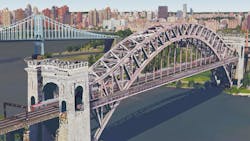MTA advances project to bring Metro-North service to Penn Station, add four new stations in the Bronx
The Environmental Assessment was published by the Metropolitan Transportation Authority (MTA) for its Metro-North Penn Station Access Project.
The project will bring Metro-North service to the west side commuter hub and add four new stations in the Bronx.
The publication begins a 45-day period for public comment. As part of this comment period, the public will be able to review project documents online and in-person at sites in the Bronx, including the Morris Park Community Association and the Bronx Jewish Community Council. A virtual public meeting on the project will be held via Zoom June 15.
The project will bring local MTA rail service to the rail line currently used by Amtrak’s Northeast Corridor for the first time and will significantly reduce travel times for East Bronx residents. The commute from Parkchester to Penn Station, currently up to 60 minutes, will be cut to as little as 20 minutes. The commute from Hunts Point to Penn Station, currently up to 45 minutes, will be cut to as little as 16 minutes. In addition to quicker access to Midtown Manhattan, East Bronx residents will now have access to job and leisure destinations that were previously difficult to reach in Westchester and Connecticut.
As part of the project, four new Metro-North stations will be built at Hunts Point, Parkchester/Van Nest, Morris Park and Co-op City.
“Additional mass transit capacity is always a plus for the environment,” said Janno Lieber, president of MTA Construction & Development. “With this project we also have the additional environmental benefit of rebuilding an existing rail facility to provide more service for more people rather than building a whole new line from scratch.”
“To be able to expand to another part of the Bronx and to help our customers more easily reach the west side of Manhattan and other employment destinations in the region is a major development and incredibly exciting for us,” said Catherine Rinaldi, president of Metro-North Railroad. “This project will give the East Bronx and all of our customers better transit options which translates to more economic and social opportunities for all.”
New York Gov. Andrew Cuomo announced the resumption of the Penn Station Access Project on May 13. The project had been paused due to the COVID-19 pandemic which put the authority’s historic 2020-2024 Capital Plan mostly on hold. The reopened process will result in the selection of a firm to design and build the four new Metro-North Railroad stations and make track upgrades in the Bronx, and bring Metro-North to the East Bronx. The MTA had identified three consortia qualified to bid for the project in February 2020, three weeks before COVID-19 arrived in New York.
The project is one of numerous efforts to make Metro-North service more attractive and useful in the Bronx. Metro-North doubled off-peak and weekend service at Melrose and Tremont in 2017 and doubled service between Manhattan and Fordham in 2019. The last Metro-North station to be newly built was also in the Bronx, at Yankees-E. 153rd Street in 2009.
Metro-North Penn Access riders from the Bronx and the New Haven Line will arrive at a Penn Station that will ultimately be transformed from the confines long familiar to Long Island Rail Road riders. The spacious new Moynihan Train Hall and a new entrance at 33rd Street and Seventh Avenue opened earlier this year. Work is now underway to nearly double the width and increase the height of the 33rd Street corridor that is the central spine of the Long Island Rail Road concourse.
The construction of the four new Bronx Metro-North stations comes at the same time the MTA is working to transform Penn Station into a world-class, 21st-century transportation hub by doubling the width and increasing the height of the 33rd Street corridor at Penn Station. The transformation of Penn Station will unite the passenger spaces of the MTA, New Jersey Transit and Amtrak into one larger, simplified space, bring in natural light from outside the station, and further improve passenger flow to and from trains within the station.
